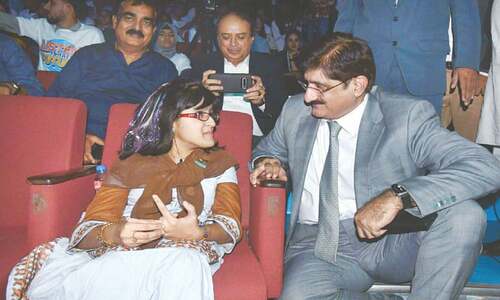THERE was a time, as has been mentioned previously, when student unions in Karachi had a strong voice which would reach the power corridors in no time. Not sure if that’s the case now. On Oct 28, 1974 the Karachi University Students Union alleged financial irregularities, involving hundreds of thousands of rupees, in the university accounts and demanded immediate probe into the financial affairs of the institution. It also alleged that some teachers were drawing salaries under different names while some heads of department had spent lavishly to furnish their offices and residences. Addressing a press conference, the union’s president Shafi Naqi Jamei offered the students’ full support to the government in unearthing corruption and cleaning up the mess.
On Nov 3, a report published in this newspaper said last August the University of Karachi (KU) had urged the government of Sindh to appoint a committee to look into the financial matters of the university to suggest remedial measures. Since the government was reluctant to interfere in the internal affairs of the institution, ‘top’ men working for KU referred the problem to the syndicate which had set up a special committee for necessary investigations. The report of the special committee was almost complete and its copy was to be handed over to the ‘full-fledged’ inquiry committee constituted by the provincial government (too many committees!). While agreeing that there were “some corruption and financial irregularities”, university officials claimed that the “matter was blown out of proportion by the students’ union”.
Youngsters became the focus of the media’s attention on Oct 31 as well when the Sindh Education Minister, Pyarali Allana, issued instructions that admissions to colleges should be given strictly on merit. He deprecated the ‘recommendation’ trend and remarked that pressures and cajolery were being brought into play to make competent people see that ‘incompetent’ students were admitted. The minister added he’d ensure the practice was discouraged at every level.
Another department was under the spotlight that week. On Oct 29, Chief Minister of Sindh Ghulam Mustafa Jatoi asked the provincial minister for local government to look into the reports that peons and chowkidars of the KMC Education Department had not received their wages for the last six months.
One the one hand, unspent money was being discussed, on the other, on Oct 28, it came to light that the façade of the five main arches of the under construction Mughal style Baradari at Polo Ground would be beautified with Hala tiles in the Kashi pattern. The scheme was approved after the KMC had tried out several designs including 400 Hala tiles; while the building plan of the Baradari was approved by the Prime Minister of Pakistan, Zulfikar Ali Bhutto. The total cost on the project was Rs60,000.
Pakistan in those days had very cordial relations with Iran. It still does. On Oct 31, the Iranian Cultural Centre organised an event to celebrate the 14th birthday of the Crown Prince of Iran, Reza Pahalvi. It was attended by, among others, the Consul-General of Iran and Mrs Manouchehr Mayoeri, members of the Iranian consulate and Persian language students. The event was rounded off with a cultural show featuring Iranian and Pakistani songs.
Published in Dawn, October 28th, 2024












































Dear visitor, the comments section is undergoing an overhaul and will return soon.